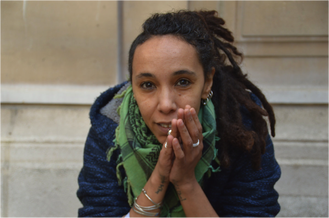 Sabreen Bint Loula
Sabreen Bint Loula I just returned from a three-day lesbian conference at the University of Ottawa, “Lesbian Artivisms in the Age of Globalization/ Artivismes lesbiens à l’ère de la mondialisation.” It was LESBIAN.
The organizers—Dominique Bourque, Johanne Coulombe, and Vanessa Plante—are to be congratulated for their courage and their vision in daring to produce a lesbian-specific symposium in the age of queer.
The conference was bilingual and featured over thirty artists, activists, and researchers from a dozen different countries. The two objectives were:
- To promote the sharing of experience, expertise and knowledge.
- To permit the establishment of transnational and interdisciplinary solidarity networks.
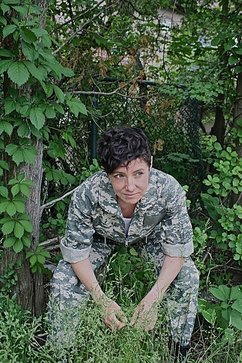 Julia Reddy as a modern-day Joan of Arc
Julia Reddy as a modern-day Joan of Arc I attended with Boston actor Julia Reddy, who was performing my play The Second Coming of Joan of Arc. I was also presenting a workshop on “Interrupting Racism: An Interactive Technique.” Because of my involvement in these presentations and also because of the need to leave early on the final day, I can only give a report on my personal experiences and impressions of this remarkable gathering.
The opening panel was titled “An ARTivists Round Table: Development of Solidarity through Art and Culture.” Sabreen Bint Loula, a French immigrant from Djibouti, was one of the panelists. A courageous activist against female genital mutilation, as well as against sexism, racism, and lesbophobia, Loula spoke poignantly about her struggles with identity as both a lesbian and as an immigrant and woman of color.
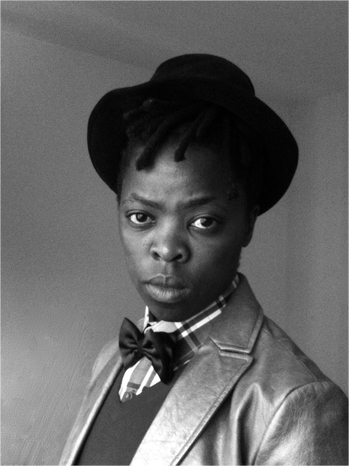 South African “artivist” Zanele Muholi
South African “artivist” Zanele Muholi Muholi founded the collective Inkanyiso, which, in their own words “works to document the lives of black lesbian women around the country; publish the work of their artists: and build skills in the use of art as an advocacy tool within their marginalized communities. What Zanele Muholi does as a visual and gender activist and artist, is to explore black lesbian identities through portraiture.”
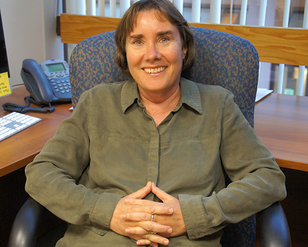 Dr. Bonnie Morris
Dr. Bonnie Morris The second was my own play about a lesbian Joan of Arc. This was the first professional performance by Boston actor Julia Reddy, and it was very well received. The French translation by Parisian translator Céline Pomès was read simultaneously by Dominque Bourque and transmitted through headsets to francophone audience members. This was the first time this translation had ever been used, and I was gratified by the positive feedback.
On the second day of the conference, a remarkable film was screened: Cerveaux mouillés d'orages (“Storm Wet Brains”) by filmmaker Karine Lhémon. The film documents the lives and the love of two lesbians, Hélène et Laurence. Both of these women suffered severe brain injuries in their twenties—Hélène Morvan from a car accident and Laurence Leroy from an incident involving a cerebral hemorrhage that was left untreated for nine hours in the hospital. The film opens with the two lesbians making preparations with friends on their wedding day—a segment filled with the playful details of getting dressed for the occasion, the logistics of transportation, and the service itself. Later in the film we discover the more urgent and political dimension of this ceremony, as Laurence’s family took aggressive steps to oppose the relationship and to regain guardianship of Laurence.
 Myriam Fougère
Myriam Fougère On the second night of the conference, Myriam Fougère’s film Lesbiana: A Parallel Revolution was screened. I was attending the conference with longtime lesbian-feminist scholar and activist Dr. Morgne Cramer, and watching the film together was like watching home movies. We kept pointing and whispering, “I was there!” “Oh, look… Bloodroot Café!” “I know her!” “The Pagoda!” The film is available in both a French and English version.
The Women Make Movies catalog describes the film as “... a road trip through the United States and Canada” where Fougère revisits “the activists of the time who sparked this revolution to define their own culture.... Told through photographs, archival footage, and contemporary interviews, Fougère’s film serves not only as a testament to the politics of the era, but also as a living yearbook and virtual reunion of these remarkable women, who laid the groundwork for generations to come.”
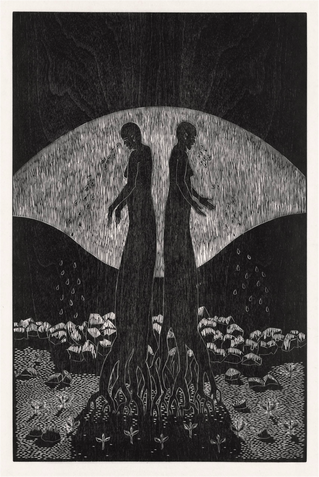 “Sorrow’s Garden” Woodcut, 26x17 in. / 66x44 cm from Memory’s Witness series
“Sorrow’s Garden” Woodcut, 26x17 in. / 66x44 cm from Memory’s Witness series I also regret that I missed visual artist Pamela Dodds' talk about her series of woodcuts, “Memory’s Witness.” These were on display, and although I had viewed images of them previously, seeing the actual woodcuts was an entirely different experience. She also brought several linocuts from her series “Ebb.”
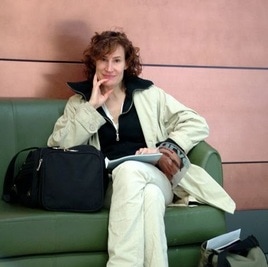 Dominque Bourque, one of the organizers of the conference.
Dominque Bourque, one of the organizers of the conference. 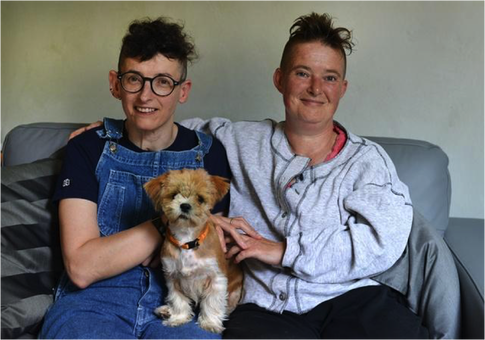

 RSS Feed
RSS Feed
